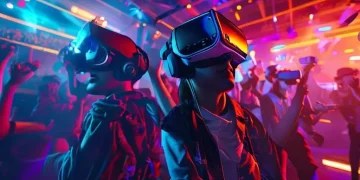US Video Game Music Revolution: 3 Composers Changing the Sound

The US video game music revolution is being led by innovative composers who are redefining the sonic landscapes of gaming, creating immersive and impactful experiences for players worldwide.
The US Video Game Music Revolution: 3 Composers Changing the Sound of Gaming is not just about background noise anymore; it’s a crucial element that elevates the entire gaming experience, and several US composers are leading the charge.
The Rise of Video Game Music as an Art Form
Video game music has evolved from simple chiptunes to complex, orchestral scores. This evolution reflects the growing recognition of video games as a legitimate art form, where music plays a crucial role in storytelling and immersion.
Early Days of Chiptunes
In the early days of video games, technical limitations dictated the simple, repetitive sounds known as chiptunes. Composers had to be incredibly creative, crafting memorable melodies with very limited resources.
The Shift to Orchestral Scores
As technology advanced, so did the possibilities for video game music. Composers began to incorporate orchestral scores, pushing the boundaries of what was possible in a gaming environment.
- The increasing power of gaming consoles and PCs allowed for more complex audio processing.
- Developers started recognizing the impact of high-quality music on the gaming experience.
- Composers with classical training began to enter the video game industry.

The shift to orchestral scores elevated the emotional depth and cinematic quality of video games, making them more immersive and engaging for players. This transition also opened doors for composers to explore new sonic territories and experiment with different musical styles.
Austin Wintory: Bridging the Gap Between Games and Classical Music
Austin Wintory is one of the most celebrated composers in the video game industry. Known for his evocative and emotionally resonant scores, Wintory has worked on a variety of projects, including the critically acclaimed indie game, Journey.
Journey: A Masterpiece of Interactive Scoring
Wintory’s score for Journey is a landmark achievement in video game music. The music dynamically responds to the player’s actions, creating a deeply personal and emotional experience.
Influences and Style
Wintory draws inspiration from classical music, world music, and film scores. His music is characterized by its lush orchestration, soaring melodies, and intricate harmonies.
- He often incorporates unconventional instruments and sounds into his compositions.
- Wintory is a strong advocate for the recognition of video game music as a legitimate art form.
- His work has been nominated for and won numerous awards, including a Grammy nomination.
Wintory’s unique approach to interactive scoring has redefined the role of music in video games, proving that it can be just as impactful and emotionally resonant as any other art form. His influence extends beyond the gaming world, inspiring composers and musicians across various genres.
Laura Karpman: Hollywood Meets Video Games
Laura Karpman is a versatile composer with a background in both Hollywood film and television and video games. She brings a cinematic sensibility to her game scores, creating immersive and dramatic soundscapes.
Background in Film and Television
Karpman has composed music for numerous films and television shows, earning her critical acclaim and recognition in the entertainment industry. Her experience in Hollywood has shaped her approach to video game music.
Collaborations on Major Game Titles
Karpman has collaborated on several major game titles, including the score for “Evermore” in the World of Warcraft franchise. Her ability to blend orchestral scores with electronic elements creates a unique and powerful sound. She also composed the score to “American Girl: Grace Stirs Up Success”, the first video game score composed by a woman to win a NAVGTR award.
Karpman’s ability to seamlessly blend orchestral scores with electronic elements creates a unique and powerful sound that enhances the overall gaming experience. Her work demonstrates the growing convergence of Hollywood and the video game industry, as composers bring their cinematic expertise to the world of gaming.

Gordy Haab: Reviving the Sounds of Star Wars
Gordy Haab is best known for his work on the Star Wars: Battlefront and Star Wars Jedi: Fallen Order video game soundtracks. He captures the iconic sound of the Star Wars universe while adding his own unique flair.
Capturing the Essence of Star Wars
Haab’s challenge was to recreate the iconic sound of John Williams’ Star Wars scores while also adding his own unique voice. He achieved this through meticulous attention to detail and a deep understanding of the Star Wars musical language.
Orchestral Arrangements and Original Compositions
Haab’s scores combine orchestral arrangements of classic Star Wars themes with original compositions that expand the musical world of the franchise.
- He worked closely with Lucasfilm to ensure authenticity.
- Haab incorporated elements from the entire Star Wars saga, including the films, television shows, and expanded universe.
- His scores have been praised for their epic scope, emotional depth, and faithfulness to the original source material.
Gordy Haab’s work on the Star Wars video game soundtracks has revitalized the musical landscape of the franchise, introducing a new generation of fans to the iconic sounds of Star Wars. His ability to capture the essence of John Williams’ scores while also adding his own unique voice has made him a valuable contributor to the Star Wars universe.
The Impact on the Gaming Industry
The contributions of these composers and others signal a broader revolution. Video game music is increasingly recognized as a pivotal element in the gaming experience, driving innovation and creativity across the industry.
Elevating the Gaming Experience
High-quality music enhances immersion, creates emotional connections, and elevates the overall gaming experience. Players are more likely to engage with a game that has a compelling soundtrack.
Driving Innovation and Creativity
Composers are constantly pushing the boundaries of what is possible in video game music. They are experimenting with new technologies, incorporating diverse musical styles, and collaborating with other artists.
- Interactive scoring is becoming more sophisticated, allowing music to respond in real-time to player actions.
- Virtual reality and augmented reality are creating new opportunities for immersive audio experiences.
- The rise of streaming services is making video game music more accessible to a wider audience.
The focus on high-quality music has elevated the gaming experience, driving a surge of innovation and creativity within the industry. By emphasizing the power of music, game developers are now more aptly creating immersive worlds and emotional connections for greater player engagement.
The Future of US Video Game Music
The future of US video game music is bright. As technology continues to evolve and the gaming industry grows, composers will have even more opportunities to create innovative and immersive soundtracks.
Emerging Technologies and Techniques
New technologies, such as spatial audio and adaptive music engines, are opening up exciting possibilities for video game composers. These technologies allow for more dynamic and personalized audio experiences.
Increased Recognition and Opportunities
Video game music is gaining more recognition in the mainstream music industry. Composers are receiving more opportunities to showcase their work and collaborate with other artists.
The US video game music revolution and the talented composers behind it are reshaping the gaming experience. As technology advances and recognition grows, the future of video game music is set to amplify the emotional and immersive landscapes of the gaming world.
| Key Point | Brief Description |
|---|---|
| 🎵 Art Form Evolution | Video game music has evolved into a recognised art form. |
| 🌟 Austin Wintory | Known for his evocative scores, especially in the game ‘Journey’. |
| 🎬 Laura Karpman | Brings a cinematic sensibility from Hollywood to games. |
| 🚀 Gordy Haab | Revives and expands the iconic ‘Star Wars’ sound in video games. |
FAQ
▼
Video game music is crucial because it heightens immersion and adds emotional depth, creating a more engaging experience. It enhances storytelling and connects players more profoundly with the game world.
▼
Interactive scoring involves music that changes dynamically based on the player’s actions, creating a unique and personalized experience. The music reacts in real-time, enhancing the narrative.
▼
Advancements such as spatial audio allow for more realistic and personalized audio environments. Adaptive music engines create dynamically changing music.
▼
Austin Wintory is a celebrated composer known for his evocative scores. He is famous for his work on the indie game Journey, and his fusion of classical and experimental methods.
▼
Composers are increasingly bridging the gap, with Hollywood talents like Laura Karpman bringing cinematic expertise to game scores, enhancing the depth and scope of video game soundscapes.
Conclusion
The US video game music revolution is transforming the gaming industry. Composers like Austin Wintory, Laura Karpman, and Gordy Haab are leading the charge, creating innovative and immersive soundtracks that elevate the gaming experience to new heights.





